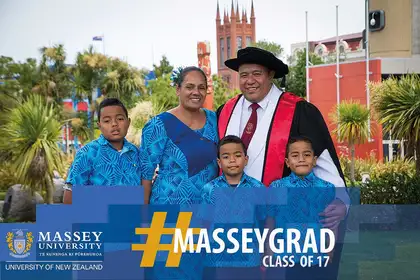
From left: Norman Pala'amo (10), Lemau Pala'amo, Alex Pala'amo (7), Dr Alesana Pala'amo and Jayden Pala'amo (6).
Pastoral counselling is one of the most important roles for ministers in Sāmoa, but a rise of individualism has contributed to a concept identified as the “changing Sāmoan self”, disrupting the traditional approaches of counselling previously employed by ministers.
Reverend Alesana Pala'amo’s PhD thesis collected the voices of a group of Sāmoan ministers and wives, matai (title-holders), church members, and service users of a domestic violence agency. It used a Tafatolu (three-sides) Sāmoan research methodology and a qualitative approach to present the group’s views.
He graduated in Palmerston North with a Doctor of Philosophy from Massey’s School of Social Work, after four years of studying on the University’s Auckland campus.
The 45-year-old, has a lot of experience with the ministerial life. Not only is he a minister himself, but also the son of retired elder minister Fosi Pala’amo.
“In the past, the Sāmoan minister was often the first person people sought help from concerning issues about their spouse, domestic violence, drugs and alcohol or relationship problems in general. However, the minister no longer is the 'go-to-person' for such problems. My research looked at where the Sāmoan person was changing from, where he or she was changing to, and how knowing these changes would shape how ministers undertake counselling with their parishioners going forward,” Dr Pala’amo says.
One possible reason for this shift can be found in the concept of a changing Sāmoan self, he says.
Explaining the "changing Sāmoan self"
“Va, or the relational space that connects and separates people, is crucial in pastoral counselling. Inappropriate management of va may prevent any success in the pastoral counselling process or can even lead to early termination of the process. The minister's wife also plays a vital role in pastoral counselling, and one approach to successful engagement with parishioners involves the inclusion of the minister's wife in the pastoral counselling process,” he says.
During his research, participants shared their expectations of being counselled as well as counselling others, together with reflections concerning effective and ineffective practices. Fetu'utu'una'i le va - navigating relational space - emerged as an applicable approach of pastoral counselling that encourages dialogue. Dr Pala’amo says this contemporary approach empowers church members to re-engage with each other, and ultimately, with God.
“The findings from my research helps with the pastoral counselling practices of ministers already in the field, as well as teaching candidates for the church ministries. It could also help current practices to align with the concept of a changing Sāmoan self,” he says.
Dr Pala’amo was surprised by the strength of the role the minister’s wife plays in pastoral counselling. “Several participants expressed that the minister's wife was likely to be more approachable, particularly by female church members, especially considering the relational space or va, between women parishioners and their minister.”
In recent times, Sāmoa has undergone significant changes. “Some examples include changing its name from Western Sāmoa to omit 'Western', shifting the international date line to align with the schedules of New Zealand and Australia, and switching which side of the road they drive on to allow affordable car imports from Japan, New Zealand and Australia”, he says. “These examples imply that Sāmoans are well-accustomed to 'change' in the various forms that it appears. Add in the effects of migration from and return to Sāmoa, together with technological advancements and globalisation, and you can see there are many different forces of change impacting Sāmoans today.
“Associated with these changes are the effects upon the Sāmoan way of life-known as fa'aSāmoa. This has seen variances in the practice and lived experiences of fa'aSāmoa. The foundational values such as love, reciprocity and respect remain for most Sāmoans, yet the lived experiences of fa'aSāmoa have changed. The term, 'A changing Sāmoan self', is a concept born from the changes that has seen a rise of individualism among the traditional communal context of most Sāmoans. For the church to maintain any relevance for its members, practices of pastoral counselling must align and address this concept,” he says.
Continuing his work in Sāmoa
Since completing his studies and returning to Sāmoa, Dr Pala’amo and his wife Lemau have founded Soul Talk Sāmoa – an agency that provides pastoral counselling and social services for Sāmoans. The couple work alongside various clients offering pastoral counselling services and advocating for the various social needs of clients. Dr Pala’amo is also working towards designing workshops and short courses run by the Congregational Christian Church Sāmoa, to develop and enhance the pastoral counselling practices of current parish ministers and their wives.
The pair are also kept busy with their three sons, Norman (10), Alex (7) and Jayden (6). The boys previously attended Bayview Primary School on Auckland’s North Shore, and have now readjusted to life and school at Sāmoa Primary School. Mrs Pala’amo is currently working remotely as a research assistant for Massey University’s School of Psychology from Sāmoa. Dr Pala’amo is now working at the Malua Theological College in Sāmoa, teaching practical theology.
Dr Pala’amo’s PhD study was primarily supervised by Associate Professor Mark Henrickson from the School of Social Work, with co-supervision from Dr Catherine Cook from the School of Nursing and former Massey University Māori researcher Dr Lily George.